
A wide personal vocabulary is essential to develop throughout one’s life, and it’s especially vital for grade students that have exams and college in their future. That’s why we’ve developed this collection of books to increase vocabulary, including one book aligned to each grade between 4th and 11th grade so that any student can stay on track. We’ve picked these novels because each has excellent diction, and they’re slightly challenging yet within the capabilities of each grade.
If you’re a student wondering “How can I improve my vocabulary?”, you’ve made it to the right place! This article isn’t just a list of books, however—we’ve included three vocabulary quizzes (one for each set of grades) with original questions from Piqosity’s team of educators, so you can quiz your current vocabulary knowledge!
One tip before we dive in: don’t be afraid to read ahead! Reading books at a level 1-2 grades ahead is a great way to learn new vocabulary if you’re an adept reader, especially if you plan to take an admissions exam like the ISEE or if you’re expecting to take the ACT/SAT in the next few years.
Books for Elementary Students to Increase Vocabulary
These books are most interesting and suitable for elementary students.
4th Grade: Tuck Everlasting, Natalie Babbitt
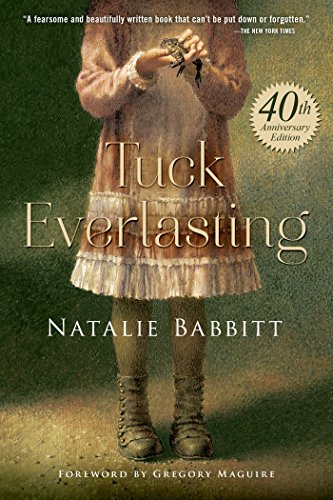 The first novel in our collection of books to increase vocabulary is an enthralling read for 10 year olds—Tuck Everlasting. This novel follows 10-year-old Winnie Foster as she runs away from home into the forest her family owns and discovers Jesse Tuck and his family, who have become immortal after drinking from a special spring of water. Winnie grows close with the family and wants to drink from the spring once she’s grown up, but a manipulative businessman puts everyone at risk. This is one of the most riveting children’s books, an adventure packed with imagery and vocabulary that will grow your reading capabilities.
The first novel in our collection of books to increase vocabulary is an enthralling read for 10 year olds—Tuck Everlasting. This novel follows 10-year-old Winnie Foster as she runs away from home into the forest her family owns and discovers Jesse Tuck and his family, who have become immortal after drinking from a special spring of water. Winnie grows close with the family and wants to drink from the spring once she’s grown up, but a manipulative businessman puts everyone at risk. This is one of the most riveting children’s books, an adventure packed with imagery and vocabulary that will grow your reading capabilities.
“And then Miles caught a fish. There it flopped, in the bottom of the boat, its jaw working, its gills fanning rapidly. Winnie drew up her knees and stared at it. It was beautiful, and horrible too, with gleaming, rainbow-colored scales, and an eye like a marble beginning to dim even as she watched it. The hook was caught in its upper lip, and suddenly Winnie wanted to weep.” (Babbitt, Chapter 17)
5th Grade: The Invention of Hugo Cabret, Brian Selznick
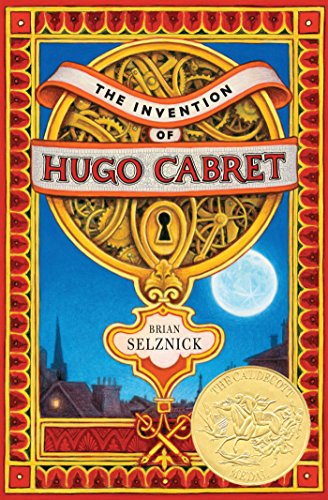 A children’s historical fiction novel, The Invention of Hugo Cabret takes place in 1930s France, following a young boy named Hugo who lives in a Paris train station and secretly maintains its clocks; at the same time, he’s attempting to repair an automaton that belonged to his father, a once-famous filmmaker. Hugo meets Isabelle when he’s caught stealing from her father’s toy booth, and together they uncover both their fathers’ pasts and explore the mysterious beginnings of filmmaking. One of the best books for fifth graders to read to expand their vocabulary, The Invention of Hugo Cabret will captivate you, especially if you read the beautifully illustrated physical book!
A children’s historical fiction novel, The Invention of Hugo Cabret takes place in 1930s France, following a young boy named Hugo who lives in a Paris train station and secretly maintains its clocks; at the same time, he’s attempting to repair an automaton that belonged to his father, a once-famous filmmaker. Hugo meets Isabelle when he’s caught stealing from her father’s toy booth, and together they uncover both their fathers’ pasts and explore the mysterious beginnings of filmmaking. One of the best books for fifth graders to read to expand their vocabulary, The Invention of Hugo Cabret will captivate you, especially if you read the beautifully illustrated physical book!
“The old man in the toy booth was arguing with the girl. She was about Hugo’s age, and he often saw her go into the booth with a book under her arm and disappear behind the counter. The old man looked agitated today. Had he figured out some of his toys were missing? Well, there was nothing to be done about that now.” (Selznick, Chapter 1)
Vocabulary Quiz for 4th-5th Graders:
Think you can breeze through those lower-level books to increase vocabulary? Test your vocabulary knowledge with this original Piqosity vocab quiz! These questions are found on the ISEE LL test, which is a standardized test geared towards 4th and 5th graders applying to 5th or 6th grade. If you excel on this quiz, try out the books for middle schoolers!
You will be presented with a single word in all caps followed by four additional words—choose the word that is most similar in meaning.
1. REGION
A. area.
B. group.
C. island.
D. map.
2. SUPPORT
A. oppose.
B. aid.
C. restrain.
D. win.
3. LABOR
A. dormant.
B. ease.
C. exertion.
D. facility.
4. MASCULINE
A. boastful.
B. clumsy.
C. male.
D. modern.
5. INCLINE
A. gravitate.
B. avoid.
C. promise.
D. impress.
Lower Level Quiz Answer Key and Explanations
- A
REGION means an area or division, specially of land, with definable characteristics.
- Area means a part or portion with no fixed boundaries.
- Group means a number of things considered as a unit.
- Island means an area of land surrounded on all sides by water.
- Map means an illustration of the characteristics of a certain region.
2. B
SUPPORT means to bear all or part of the weight; give assistance to.
- Oppose means to refuse to give in to.
- Aid means to give assistance to.
- Restrain means to hold back or bar someone from doing something.
- Win means to overcome and be victorious.
3. C
LABOR means to work hard; work.
- Dormant means having normal functions suspended or slowed.
- Ease means reduce; to make smaller in volume, amount, or extent.
- Exertion means physical or mental effort.
- Facility means a place or piece of equipment provided for a particular purpose.
4. C
MASCULINE means having qualities attributed to men.
- Boastful means showing excessive pride.
- Clumsy means having or showing an inability to move in a graceful manner.
- Male means related to qualities attributed to men.
- Modern means being or involving the newest methods, styles, concepts, or information.
5. A
INCLINE means to feel favorably disposed toward something.
- Gravitate means to be drawn to or favorably disposed toward something.
- Avoid means to keep away from (usually a responsibility) through cleverness or trickery.
- Promise means to make a solemn declaration of intent.
- Impress means to act upon a person (or a person’s feelings) to get a response.
Books to Increase Vocabulary for Middle Schoolers
These books are most interesting and suitable for middle school students to read, but they’re also great for older or younger students with a higher reading level!
6th Grade: Jane Eyre, Charlotte Brontë
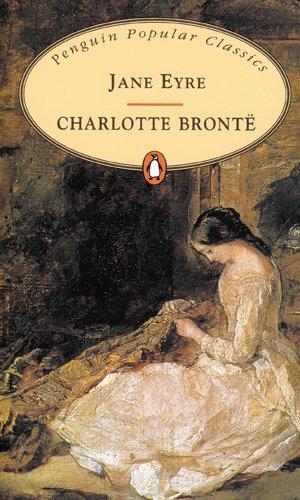 A coming-of-age story from another era that you’ll still be able to relate to, Jane Eyre is one of the best classic novels for middle grade readers. Jane is an orphaned girl that’s been outcasted her whole life, treated poorly by the people around her since she was young. Follow her as she grows up and falls in love—will she be isolated again, or has she found her family? With a strong female protagonist that has inspired young readers for generations, Jane Eyre is drenched with precise diction and themes that will resonate with you.
A coming-of-age story from another era that you’ll still be able to relate to, Jane Eyre is one of the best classic novels for middle grade readers. Jane is an orphaned girl that’s been outcasted her whole life, treated poorly by the people around her since she was young. Follow her as she grows up and falls in love—will she be isolated again, or has she found her family? With a strong female protagonist that has inspired young readers for generations, Jane Eyre is drenched with precise diction and themes that will resonate with you.
“Our clothing was insufficient to protect us from the severe cold: we had no boots, the snow got into our shoes and melted there: our ungloved hands became numbed and covered with chilblains, as were our feet: I remember well the distracting irritation I endured from this cause every evening, when my feet inflamed; and the torture of thrusting the swelled, raw, and stiff toes into my shoes in the morning.“ (Brontë, Chapter 7)
7th Grade: They Both Die at the End, Adam Silvera
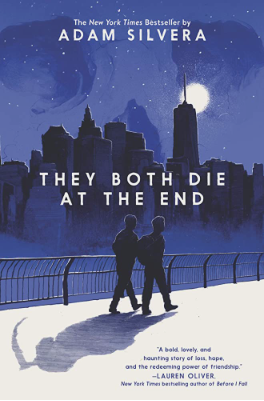 If you’re wondering what to read that will captivate you, expand your vocabulary, and make you a little existential—this is the book for you. Despite the slightly morbid title, They Both Die at the End is heartwarming and optimistic. Mateo and Rufus have both been notified that they’ll die by the end of the day, so they meet up to make the most of the last day of their lives. This novel chronicles their last day on Earth, a moving story that will remind you of the beauty in life.
If you’re wondering what to read that will captivate you, expand your vocabulary, and make you a little existential—this is the book for you. Despite the slightly morbid title, They Both Die at the End is heartwarming and optimistic. Mateo and Rufus have both been notified that they’ll die by the end of the day, so they meet up to make the most of the last day of their lives. This novel chronicles their last day on Earth, a moving story that will remind you of the beauty in life.
“The roar of the approaching train drowns Mateo out a little at the end there, but it’s fine, I get what he’s saying. The real victory here is catching a train instantly. Now we can safely rule out falling onto the exposed tracks, getting stuck while rats run by us, and straight chopped up and flattened by the train—Mateo’s grimness is already rubbing off on me.” (Silvera, page 73).
8th Grade: The Hobbit, J. R. R. Tolkein
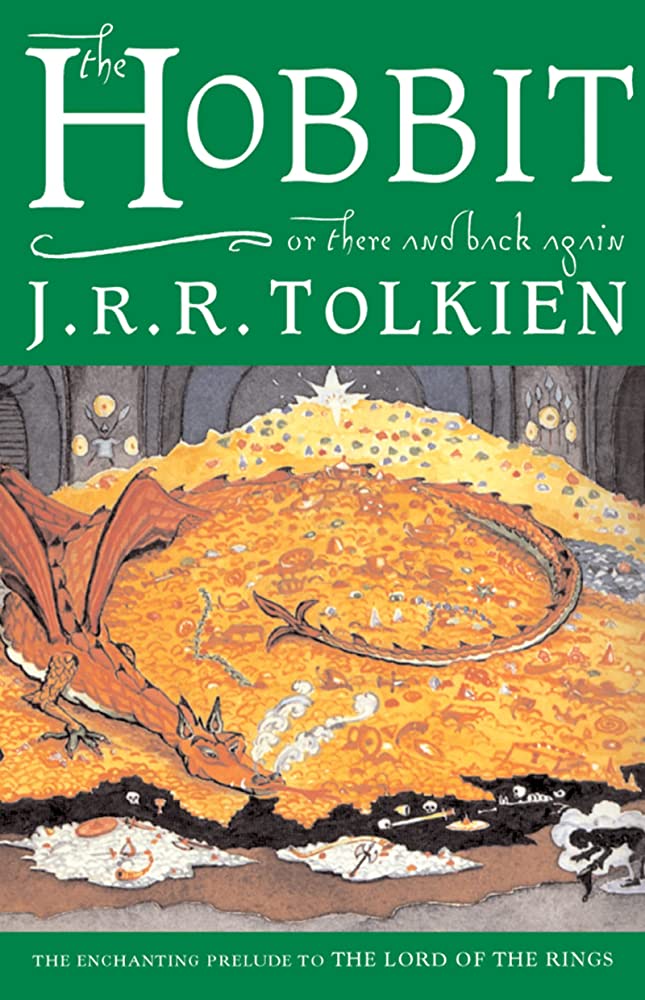 There’s a reason that The Lord of the Rings trilogy and The Hobbit are so well-loved: readers are transported into Middle Earth and faced with magical events, moral dilemmas, and complex characters. The Hobbit is a thematically rich fantasy read, excellent for 8th graders due to its humor, excitement, and potential to improve your vocabulary. Follow Bilbo Baggins as he journeys with the wizard Gandalf and a group of dwarves to recover their treasure from the dangerous dragon, Smaug.
There’s a reason that The Lord of the Rings trilogy and The Hobbit are so well-loved: readers are transported into Middle Earth and faced with magical events, moral dilemmas, and complex characters. The Hobbit is a thematically rich fantasy read, excellent for 8th graders due to its humor, excitement, and potential to improve your vocabulary. Follow Bilbo Baggins as he journeys with the wizard Gandalf and a group of dwarves to recover their treasure from the dangerous dragon, Smaug.
“Bilbo knew it. He had read of a good many things he had never seen or done. He was very much alarmed, as well as disgusted; he wished himself a hundred miles away, and yet-and yet somehow he could not go straight back to Thorin and Company emptyhanded. So he stood and hesitated in the shadows.” (Tolkein, page 22).
Vocabulary Quiz for 6-8th Graders:
Test your vocabulary knowledge with this original Piqosity vocabulary quiz! These questions are found on the ISEE ML test, which is a standardized test geared towards 6th and 7th graders applying to 7th or 8th grade. If you excel on this quiz, try out the books for high schoolers!
You will encounter two types of questions: synonyms and fill-in-the-blank sentence completions. For the synonym questions, you will be presented with a single word in all caps followed by four additional words—choose the word that is most similar in meaning. The second set of questions are sentence completions where you are presented with a sentence that has 1 blank—choose the answer that best fits in the blank.
1. SUSTAIN
A. conceal.
B. maintain.
C. promise.
D. withstand.
2. ACCENTUATE
A. alter.
B. contrast.
C. emphasize.
D. replace.
3. Although Simone Biles makes all of her gymnastics routines look ——-, her routines are actually extremely complicated and demanding.
A. effortless.
B. familiar.
C. prestigious.
D. tedious.
4. The students were unable to understand any of the class material due to the professor’s ——- lectures and confusing homework assignments.
A. incoherent.
B. lucid.
C. monotonous.
D. rational.
5. The young man thought he could handle the spicy food, but after his first bite, he began to ——- the decision to order it.
A. applaud.
B. celebrate.
C. rue.
D. savor.
Middle Level Quiz Answer Key and Explanations
- A
SUSTAIN means to give support, nourishment, or relief to.
- Conceal means to to prevent disclosure or recognition of.
- Maintain means to keep in an existing state.
- Promise means to pledge to do.
- Withstand means to resist successfully.
2. C
ACCENTUATE means to highlight or single out as important.
- Alter means to make different.
- Contrast means to set off in contrast.
- Emphasize means to place importance on.
- Replace to put something new in the place of.
3. A
The purpose of this sentence is to identify the word that most nearly means easy. The best answer is (A), effortless, which means requiring no physical or mental exertion.
4. A
This item asks you to identify the word that most nearly means confusing. The best answer is (A), incoherent, which means (of spoken or written language) expressed in an incomprehensible or confusing way; unclear.
5. C
The word “rue” means to feel regret or sorrow for something. In the given sentence, the young man thought he could handle the spicy food but after his first bite, he realized his mistake and began to regret his decision.
Books to Increase Vocabulary for High Schoolers
Based on their diction, content, and complexity, these books to increase vocabulary are most interesting and suitable for upper Middle and High School Students.
9th Grade: Journey to the Center of the Earth, Jules Verne
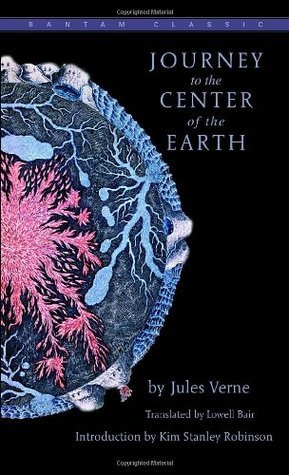 Professor Otto Lidenbrock has discovered a coded message revealing the location of a passage to the center of the Earth—joined by his nephew and a local guide, he descends into the crater of an extinct volcano on this mission. The trio encounter prehistoric animals, dangerous tunnels, and magnificent sights from a time long past as they make their way towards our planet’s molten core. This science fiction novel from over 150 years ago is an exciting adventure to learn more about our planet’s past—expand your vocabulary and your horizons with this read!
Professor Otto Lidenbrock has discovered a coded message revealing the location of a passage to the center of the Earth—joined by his nephew and a local guide, he descends into the crater of an extinct volcano on this mission. The trio encounter prehistoric animals, dangerous tunnels, and magnificent sights from a time long past as they make their way towards our planet’s molten core. This science fiction novel from over 150 years ago is an exciting adventure to learn more about our planet’s past—expand your vocabulary and your horizons with this read!
“The rugged summits of the rocky hills were dimly visible on the edge of the horizon, through the misty fogs; every now and then some heavy flakes of snow showed conspicuous in the morning light, while certain lofty and pointed rocks were first lost in the grey low clouds, their summits clearly visible above, like jagged reefs rising from a troublous sea.” (Verne, Chapter 9)
10th Grade: I Know Why the Caged Bird Sings, Maya Angelou
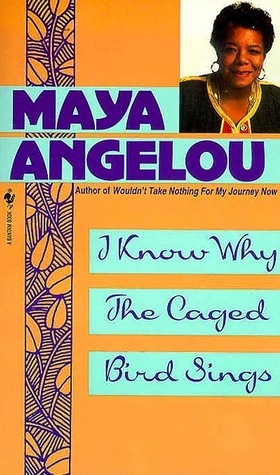 This debut memoir from Maya Angelou is a gripping story, chronicling Angelou’s life as a young black girl in an oft-hateful America. Despite the discrimination and hardships she faces from a young age, Maya develops resiliency and self-respect, particularly with the help of literature and her family. A powerful, joyful, and painful coming-of-age story, this read will touch your heart, expand your awareness, and improve your reading skills and vocabulary.
This debut memoir from Maya Angelou is a gripping story, chronicling Angelou’s life as a young black girl in an oft-hateful America. Despite the discrimination and hardships she faces from a young age, Maya develops resiliency and self-respect, particularly with the help of literature and her family. A powerful, joyful, and painful coming-of-age story, this read will touch your heart, expand your awareness, and improve your reading skills and vocabulary.
“People spoke of Momma as a good-looking woman and some, who remembered her youth, said she used to be right pretty. I saw only her power and strength. She was taller than any woman in my personal world, and her hands were so large they could span my head from ear to ear. Her voice was soft only because she chose to keep it so.” (Angelou, Chapter 7)
11th Grade: 1984, George Orwell
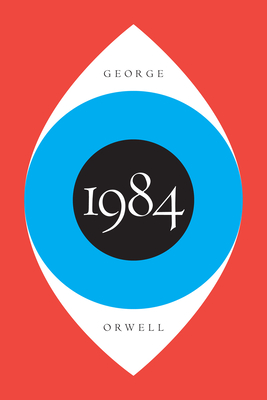 This final read can’t not be in this list of books to increase vocabulary. In a dystopian society where the government constantly surveils and controls everyone, how can you have free will and individuality? Protagonist Winston works in this government, and he’s responsible for rewriting history to match the current political agenda; however, he secretly hates the government and plots to overthrow it. A classic science fiction novel that will broaden your perspective and diction, 1984 explores the dangers of totalitarianism and stresses the importance of our freedoms of thought and expression.
This final read can’t not be in this list of books to increase vocabulary. In a dystopian society where the government constantly surveils and controls everyone, how can you have free will and individuality? Protagonist Winston works in this government, and he’s responsible for rewriting history to match the current political agenda; however, he secretly hates the government and plots to overthrow it. A classic science fiction novel that will broaden your perspective and diction, 1984 explores the dangers of totalitarianism and stresses the importance of our freedoms of thought and expression.
“More even than of strength, he gave an impression of confidence and of an understanding tinged by irony. However much in earnest he might be, he had nothing of the single-mindedness that belongs to a fanatic. When he spoke of murder, suicide, venereal disease, amputated limbs, and altered faces, it was with a faint air of persiflage.” (Orwell, Chapter 16)
Vocabulary Quiz for 9-11th Graders:
Test your vocabulary knowledge with this original Piqosity vocabulary quiz! These questions are found on the ISEE UL test, which is a standardized test geared towards 8th-11th graders applying to 9th-12th grade. If you excel on this quiz, try out these books to read before college!
You will encounter two types of questions: synonyms and fill-in-the-blank sentence completions. For the synonym questions, you will be presented with a single word in all caps followed by four additional words—choose the word that is most similar in meaning. The second set of questions are sentence completions where you are presented with a sentence that has 1 blank—choose the answer that best fits in the blank.
1. JUMBLE
A. miscreant.
B. mishmash.
C. momentum.
D. novice.
2. The teacher hoped her students would ——- the extra credit assignment to get ahead in her class, but most of them used the assignment to ——- for missing work.
A. seek . . . include.
B. execute . . . emphasize.
C. surrender . . . remedy.
D. utilize . . . compensate.
3. Always ——-, Frank never let his temper get the best of him, even when dealing with particularly —— situations that would surely annoy anyone else.
A. apathetic . . . baffling.
B. outspoken . . . irritating.
C. patient . . . pleasant.
D. stoic . . . irksome.
4. DISAVOW
A. repudiate.
B. avenge.
C. supplant.
D. jeopardize.
5. VOCIFEROUS
A. evanescent.
B. garrulous.
C. vehement.
D. lavish.
Upper Level Quiz Answer Key and Explanations
- B
JUMBLE means an untidy collection of things.
- Miscreant means a person who behaves badly.
- Mishmash means a varied mixture of things.
- Momentum is the motion of a moving body.
- Novice is an inexperienced person.
2. D
The teacher hoped her students would utilize the extra credit assignment to get ahead in her class, but most of them used the assignment to compensate for missing work.
From the context of these sentences, we know a few things:
The first blank refers to the hopes of the teacher in terms of the correlation between her students and the extra credit assignment. Therefore, the first blank needs to show how she wanted the students to use the assignment.
The second blank refers to how the students actually treated the assignment. We know that they did not treat the assignment as a way to enhance their grades. Rather, they used it to do something because of their missing work. So, the students likely saw the assignment as a way to make up for their missing work.
Utilize is the best word for the first blank because it conveys the teacher’s hope that her students would use the extra credit assignments to get ahead in class. While seek and execute may also work, we have to consider the second blank as well. The best word to fill in the second blank is “compensate” because it shows how the students used the extra credit assignments to make up for their missing work. Include does not make sense in the context of the sentence. The students also wouldn’t have wanted to emphasize their missing work. While remedy works in this context, surrender does not work for the first blank.
3. D
Always stoic, Frank never let his temper get the best of him, even when dealing with particularly irksome situations that would surely annoy anyone else.
We know that Frank doesn’t show his temper, even when he’s dealing with situations that would annoy other people. The first blank describes Frank, and the second blank describes situations that annoy people. If a situation is annoying, it would be irksome or irritating. Baffling could work, but it is not the best fit. Additionally, pleasant situations usually don’t annoy people. Since Frank doesn’t show his temper even when dealing with these annoying situations, we know he is either stoic or patient. Outspoken would mean that Frank freely spoke whatever is on his mind, so that doesn’t fit the context. Sympathetic also doesn’t fit the context because the sentence has not described a situation in which Frank would be sympathetic. Since the only answer choice that includes words suitable for both blanks is “stoic . . . irksome,” that is the right answer.
4. A
DISAVOW means to deny any responsibility or support for.
- Repudiate means to refuse to accept.
- Avenge means to take vengeance for or on behalf of.
- Supplant means to supersede especially by force or treachery.
- Jeopardize means to expose to danger or risk.
5. C
VOCIFEROUS means forceful or clamorous.
- Garrulous means excessively talkative.
- Evanescent means quickly fading or disappearing.
- Vehement means forceful or passionate.
- Lavish means extravagantly rich or luxurious.
Improve Your Reading Skills with Piqosity
We hope you’ve enjoyed perusing these books to increase vocabulary, and good luck on the quizzes if you have yet to take them! If you have taken them and want to find a way to improve your vocabulary and reading skills outside of just reading, Piqosity is here to help!
Along with our ISEE, SAT, and ACT test prep courses, we offer full online English courses—each includes dozens of concept lessons, personalized practice software, and over 100 reading comprehension passages.
- 5th Grade English Course
- 6th Grade English Course
- 7th Grade English Course
- 8th Grade English Course
- 9th Grade English Course
- 10th Grade English Course (new!)
- 11th Grade English Course
The best part? You can try out all of Piqosity’s features with our free community account. When you’re ready to upgrade, Piqosity’s year-long accounts start at only $89. Plus, get a 10% off coupon just by signing up for our mailing list!


